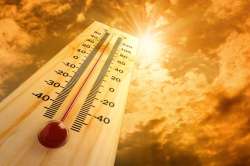You cannot protect yourself from heat strokes even in your car
Heat stroke is most likely to affect older people who live in homes lacking proper air conditioning or well-balanced airflow.

Summer is at its all time high and so is the use of air conditioner. After all, in all this heat, air conditioner is the only refuge we have. But continuously switching over between an air conditioned environments to non-AC zone can affect your health drastically. You cannot protect yourself from heat stroke even in your cars. When the temperature is high, even the cars cannot shield you from the heat wave. If you have to drive during the peak hours of afternoon, make sure that the cooling of your car is perfect. Rising temperatures in the car can be drastic for your health.
If you belong to older adult group than you’re more prone to heat strokes than the younger ones. According to Dr R.K. Singal, principal consultant and director and coordinator of Medical and Allied Services, BLK Super Speciality Hospital, "Prolonged exposure to high temperatures along with dehydration could lead to a Heat stroke which is failure of the body's temperature control system. Heatstroke is a medical emergency hence immediate first aid to be taken is to cool the body temperature".
Also Read: Knowing these 10 signs of a Stroke can save your life!
Here are few ways in which you can protect yourself or your closed ones from heat strokes.
- Move the person from direct sunlight and take him to a cooler place
- Immediately take off extra clothes and spray cold water to low the body temperature
- Use Ice packs over the body if the temperature doesn't come down
- Do not give any self-medication especially asprin incase the person suffering from severe headache
- Give fluids, cold water is the best
When the body temptation is greater than 104 degrees Fahrenheit, it is termed as Heat Stroke with complications involving the central nervous system that occur after exposure to high temperatures. Other common symptoms include seizures, nausea, confusion, disorientation, and sometimes loss of consciousness or even coma.
Precautions to avoid heat stroke
- Stay in-doors and avoid exposure the direct sunlight for long periods
- Wear comfortable clothes avoid tight fitting & excessive clothes as they don't allow your body to cool easily
- Drink plenty of fluids throughout the day keeps the electrolyte balance in your body
- Avoid packaged juices that are high in calories; also avoid caffeine and alcohol which may cause dehydration
- Avoid too much of travelling and stay in; restrict travelling in peak sun
- Eat light food and stay from spicy food
- Do not leave anyone alone in a parked car, specially children
If you are at higher risk, be cautious - Heat stroke is most likely to affect older people who live in homes lacking proper air conditioning or well-balanced airflow. If you are on fluid restricted diets or have any pre-condition like Epilepsy, Kidney, liver or heart disease, consult your doctors before increasing fluid intake.